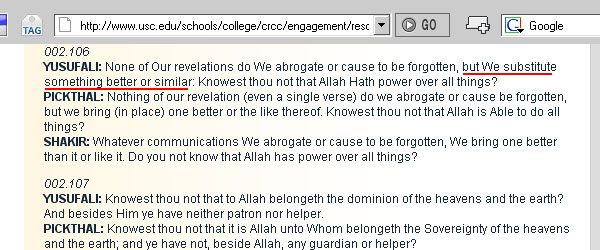Taqiyyah(3:28, 16:106): The Holy Deception"
"No Compulsion in Religion" 2:256 (this passage revealed just after the Muslims reached Medina and were still vulnerable & Muh. still wore a mask to woo new converts with his "sugary" preaching) Abrogated (Naskh) "canceled" through the later (Medina) famous "Verse of the Sword" 9:5 "KILL the unbelievers (mushrikun) wherever you find them" :: The greatest Qur'anic commentator Ibn Kathir "… means, on the earth in general" (1.3 MB) which cancelled (2:106) at least 124 pacefully suras
(1.3 MB) which cancelled (2:106) at least 124 pacefully suras
Page 25 The respected imams Jalal al-Din Muhammad ibn Ahmad al-Mahalli (1389-1459) and Jalal al-Din 'Abd al-Rahman ibn Abi Bakr al-Suyuti (1445-1505)
"AHMAD, ALLAH, AND ABROGATION" "… substitute something better or similar …

Good example of taqiyyah: Allah should only replaced pre-Qur'anic revelations (verses)
— BUT there is NO reference about "pre-" in his Qur'an! In reality, early peaceful verses (Mecca) through late violent verses (Medina)
"No Compulsion in Religion" 2:256 (this passage revealed just after the Muslims reached Medina and were still vulnerable & Muh. still wore a mask to woo new converts with his "sugary" preaching) Abrogated (Naskh) "canceled" through the later (Medina) famous "Verse of the Sword" 9:5 "KILL the unbelievers (mushrikun) wherever you find them" :: The greatest Qur'anic commentator Ibn Kathir "… means, on the earth in general"
Page 25 The respected imams Jalal al-Din Muhammad ibn Ahmad al-Mahalli (1389-1459) and Jalal al-Din 'Abd al-Rahman ibn Abi Bakr al-Suyuti (1445-1505)
"AHMAD, ALLAH, AND ABROGATION" "… substitute something better or similar …

… CONCLUSION … but the Quran claims that it is "nazil" which means "brought down" from heaven without the touch of human hand. This implies that the original, uncreated, preserved tablets in heaven, from which the Qur'an proceeded (sura 85:22), also contains these abrogations. The root is corrupt.
The doctrine of abrogation presents God as capricious, erratic, and changeable, and it casts Muhammad in a doubtful light. This god couldn't make up his mind and because of his confusion Muslims today are uncertain about what rules are applicable in their own religion. Muhammad's "god" appears to be all too human. Muhammad's god appears to be Muhammad. Like Felix the Cat … "whenever he gets in a fix, he reaches into his bag of tricks", Muhammad used his god when he needed to get out of a jam, or change the way he wanted things done.
These abrogations shaped Islam over Muhammad's 23 years of claimed prophethood. As Muhammad grew in power Islam changed from peaceful to violent. If it is true that "the measure of a man is what he does with power," then Muhammad proved himself to be a small man for he used his power to subject people brutally and compel them to accept Islam (9:29). The trail of blood behind Muhammad grew ever wider.""… If God comes to the conclusion that he has to abrogate and make new orders then this is admitting that he made mistakes. It shows that what he gave before was not perfect. It could be improved.
Your scenario accuses God of making mistakes.
But God is all-knowing, he is not surprised by new circumstances and new ideas. It is against the nature and attributes of God to change his mind. And clearly, if God had changed the Qur'an before he revealed it then we would never have known about the change. …"
The Doctrine of Abrogation
Here's something you don't hear "moderate" Muslims talking about: The Qur'an is essentially made up of two halves the meccan and median, which have been knitted together in a non-chronological order.
Mohammed wrote the first 'peace and loving' half in Mecca when he was trying to get support for his fledgling movement.
The secound 'blood and guts' half calling for the subjugation, proselytization and/or execution of non-believers was recorded in Medina, when he had assassinated all the dissenters and formed his brutal totalitarian state.
Now, the important bit to note is this:
The latter half of the Qur'an dictates that all laws written prior to the Medinan scriptures were made null and void in what is known as the
Doctrine of Abrogation!
This means, quite simply, that Islam is not a religion of peace, and that all those who are so-called "moderate" Muslims are in fact wishy-washy practitioners who digest their holy book al â carte.
It is the jihadists & terrorists who are the true Muslims and faithful followers of Islam as proscribed by the war mongering, Jew-hating, preadolescent (prepubescent)-girl-humping Prophet himself.
How can an "all-knowing" god makes so often mistakes and abrogate verses? It is like a human who learns how to live!
local: